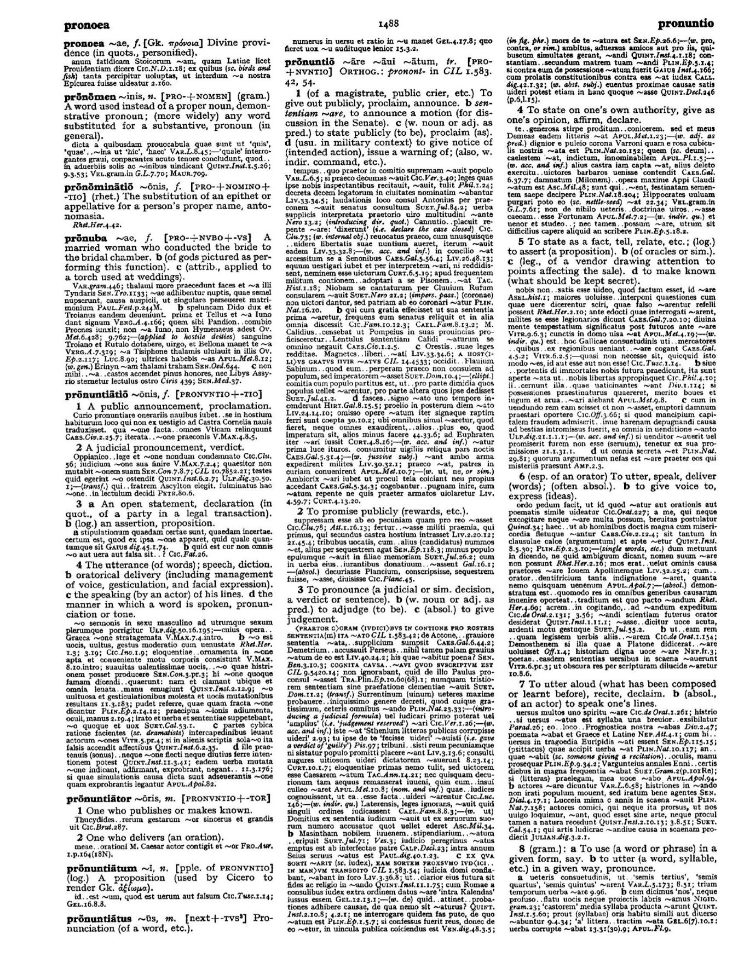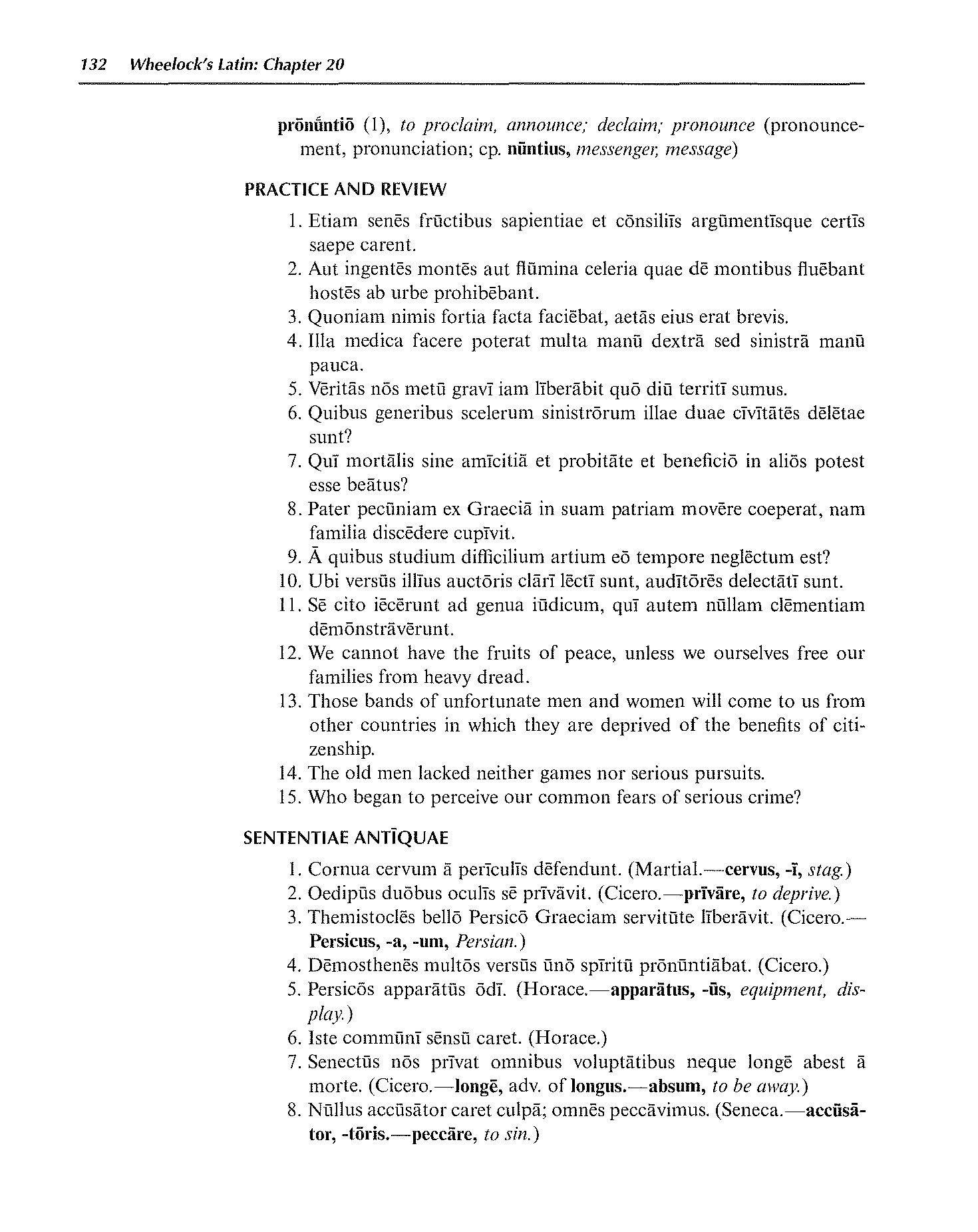
page_listing.tpl
page_subListingDetails.tpl
sub_listingDetails_style1.tpl
sub_listingDetails.title.tpl
prōnūntiāre to proclaim
prōnūntiāre is a Latin Verb that primarily means to proclaim.
Definitions for prōnūntiāre
Wheelock's Latin
Verb
- 1
to proclaim, announce, declaim, pronounce
English derivatives:
pronouncement pronunciation
Oxford Latin Dictionary
Verb
- 1
(of a magistrate, public crier, etc.) To give out publicly, proclaim, announce. (b) sensentiam ~are, to announce a motion (for discussion in the Senate). (c) (w. noun or adj. as pred.) to state publicly (to be), proclaim (as). (d) (usu. in military context) to give notice of (intended action), issue a warning of: (also, w. indir. command, etc.).
- 2
To promise publicly (rewards, etc.).
- 3
To pronounce (a judicial or sim. decision, a verdict or sentence). (b) (w. noun or adj. as pred.) to adjudge (to be). (c) (absol.) to give judgement.
- 4
To state on one's own authority, give as one's opinion, affirm, declare.
- 5
To state as a fact, tell, relate, etc.; (log.) to assert (a proposition). (b) (of oracles or sim.). (c) (leg., of a vendor drawing attention to points affecting the sale). (d) to make known (what should be kept secret).
Sentences with prōnūntiāre
Latin to English
Modesto tamen et circumspecto iudicio de tantis viris pronuntiandum est, ne, quod prelisque accidit, damnent quae non intelligunt.Compare Modesty and circumspection are required in pronouncing judgment on such great men [famous authors], since there is always the risk of falling into the common fault of condemning what one does not understand.
Conjugation table for prōnūntiāre
Cactus2000
| ACTIVE | |
| Indicative present | Indicative imperfect |
| prōnūntiō prōnūntiās prōnūntiat prōnūntiāmus prōnūntiātis prōnūntiant | prōnūntiābam prōnūntiābās prōnūntiābat prōnūntiābāmus prōnūntiābātis prōnūntiābant |
| Indicative perfect | Indicative pluperfect |
| prōnūntiāvī prōnūntiāvistī prōnūntiāvit prōnūntiāvimus prōnūntiāvistis prōnūntiāvērunt / prōnūntiāvēre | prōnūntiāveram prōnūntiāverās prōnūntiāverat prōnūntiāverāmus prōnūntiāverātis prōnūntiāverant |
| Indicative future | Indicative future perfect |
| prōnūntiābō prōnūntiābis prōnūntiābit prōnūntiābimus prōnūntiābitis prōnūntiābunt | prōnūntiāverō prōnūntiāveris prōnūntiāverit prōnūntiāverimus prōnūntiāveritis prōnūntiāverint |
| Subjunctive present | Subjunctive imperfect |
| prōnūntiem prōnūntiēs prōnūntiet prōnūntiēmus prōnūntiētis prōnūntient | prōnūntiārem prōnūntiārēs prōnūntiāret prōnūntiārēmus prōnūntiārētis prōnūntiārent |
| Subjunctive perfect | Subjunctive pluperfect |
| prōnūntiāverim prōnūntiāveris prōnūntiāverit prōnūntiāverimus prōnūntiāveritis prōnūntiāverint | prōnūntiāvissem prōnūntiāvissēs prōnūntiāvisset prōnūntiāvissēmus prōnūntiāvissētis prōnūntiāvissent |
Infinitive present prōnūntiāre Infinitive perfect prōnūntiāvisse Infinitive future prōnūntiātūrum esse | Imperative present prōnūntiā prōnūntiāte Imperative future prōnūntiātō prōnūntiātō prōnūntiātōte prōnūntiantō |
| PASSIVE | |
| Indicative present | Indicative imperfect |
| prōnūntior prōnūntiāris prōnūntiātur prōnūntiāmur prōnūntiāminī prōnūntiantur | prōnūntiābar prōnūntiābāris / prōnūntiābāre prōnūntiābātur prōnūntiābāmur prōnūntiābāminī prōnūntiābantur |
| Indicative perfect | Indicative pluperfect |
| prōnūntiātus sum prōnūntiātus es prōnūntiātus est prōnūntiātī sumus prōnūntiātī estis prōnūntiātī sunt | prōnūntiātus eram prōnūntiātus erās prōnūntiātus erat prōnūntiātī erāmus prōnūntiātī erātis prōnūntiātī erant |
| Indicative future | Indicative future perfect |
| prōnūntiābor prōnūntiāberis / prōnūntiābere prōnūntiābitur prōnūntiābimur prōnūntiābiminī prōnūntiābuntur | prōnūntiātus erō prōnūntiātus eris prōnūntiātus erit prōnūntiātī erimus prōnūntiātī eritis prōnūntiātī erunt |
| Subjunctive present | Subjunctive imperfect |
| prōnūntier prōnūntiēris / prōnūntiēre prōnūntiētur prōnūntiēmur prōnūntiēminī prōnūntientur | prōnūntiārer prōnūntiārēris / prōnūntiārēre prōnūntiārētur prōnūntiārēmur prōnūntiārēminī prōnūntiārentur |
| Subjunctive perfect | Subjunctive pluperfect |
| prōnūntiātus sim prōnūntiātus sīs prōnūntiātus sit prōnūntiātī sīmus prōnūntiātī sītis prōnūntiātī sint | prōnūntiātus essem prōnūntiātus essēs prōnūntiātus esset prōnūntiātī essēmus prōnūntiātī essētis prōnūntiātī essent |
Infinitive present prōnūntiārī Infinitive perfect prōnūntiātum esse Infinitive future prōnūntiātum īrī | Imperative present prōnūntiāre prōnūntiāminī Imperative future prōnūntiātor prōnūntiātor - prōnūntiāntor |
| PARTICIPLE | ||
| Participle present active | ||
| Nom. | prōnūntiāns | prōnūntiantēs |
| Gen. | prōnūntiantis | prōnūntiantium |
| Dat. | prōnūntiantī | prōnūntiantibus |
| Acc. | prōnūntiantem | prōnūntiantēs |
| Abl. | prōnūntiante | prōnūntiantibus |
| Participle future active | ||
| Nom. | prōnūntiātūrus | prōnūntiātūrī |
| Gen. | prōnūntiātūrī | prōnūntiātūrōrum |
| Dat. | prōnūntiātūrō | prōnūntiātūrīs |
| Acc. | prōnūntiātūrum | prōnūntiātūrōs |
| Abl. | prōnūntiātūrō | prōnūntiātūrīs |
| Participle perfect passive | ||
| Nom. | prōnūntiātus | prōnūntiātī |
| Gen. | prōnūntiātī | prōnūntiātōrum |
| Dat. | prōnūntiātō | prōnūntiātīs |
| Acc. | prōnūntiātum | prōnūntiātōs |
| Abl. | prōnūntiātō | prōnūntiātīs |
| Gerundive | ||
| Nom. | prōnūntiandus | prōnūntiandī |
| Gen. | prōnūntiandī | prōnūntiandōrum |
| Dat. | prōnūntiandō | prōnūntiandīs |
| Acc. | prōnūntiandum | prōnūntiandōs |
| Abl. | prōnūntiandō | prōnūntiandīs |
| Gerund | Supine | |
| Nom. | prōnūntiāre | prōnūntiātum |
| Gen. | prōnūntiandī | prōnūntiātū |
| Dat. | prōnūntiandō | |
| Acc. | prōnūntiandum | |
| Abl. | prōnūntiandō | |
Data sources
Notes
- Definitions
- Frederick M. Wheelock, Wheelock's Latin, 6th ed., rev. Richard A. LaFleur (New York, NY: HarperCollins Publishers, 2005): 132.
- P. G. W. Glare, Oxford Latin Dictionary, Vols. 1-8 (Oxford: Clarendon Press, 1982): 1488.
- Word frequencies
- Paul B. Diederich, The Frequency of Latin Words and Their Endings, PhD diss., (Columbia University, 1939).
Bibliography
Allen, Joseph H. Allen and Greenough's New Latin Grammar for Schools and Colleges: Founded on Comparative Grammar. Edited by James B. Greenough, George L. Kittredge, Albert A. Howard, and Benjamin L. D'Ooge. Boston, MA: Ginn & Company, 1903.
Crystal, David. A Dictionary of Linguistics and Phonetics. 6th ed. Oxford, UK: Blackwell Publishing, 2008.
Delatte, Louis, Suzanne Govaerts, Joseph Denooz, and Etienne Evrard. Dictionnaire fréquentiel et index inverse de la langue latine [Frequency Dictionary and Inverse Index of the Latin Language]. Liège, Belgium: Laboratoire d'analyse statistique des langues anciennes de l'Université de Liège (L.A.S.L.A.), 1981.
Diederich, Paul B. The Frequency of Latin Words and Their Endings. PhD diss., Columbia University, 1939.
Francese, Christopher. "Latin Core Vocabulary." Dickinson College Commentaries. Last modified 2014. http://dcc.dickinson.edu/latin-vocabulary-list.
Gildersleeve, Basil L., and Gonzales Lodge. Gildersleeve's Latin Grammar: Third Edition, Revised, and Enlarged. 3rd ed. London, England: Macmillan and Co., 1903.
Glare, Peter G.W. Oxford Latin Dictionary. Vols. 1-8. Oxford, England: Clarendon Press, 1982.
Krüger, Bernd. "Latin Conjugation Tables." Cactus2000. Accessed May 5, 2023. https://latin.cactus2000.de/index.en.php.
Pierson, Nick. "Sound of Text." Accessed October 26, 2019. https://soundoftext.com.
Wheelock, Frederick M. Wheelock's Latin. 6th ed. Revised by Richard A. LaFleur. New York, NY: HarperCollins Publishers, 2005.
Wiktionary Contributors. "Victionarium." Wikimedia Foundation, Inc. Updated March 18, 2019. https://la.wiktionary.org/wiki/Victionarium:Pagina_prima.
Citation
Chicago (17th ed.)
Allo Contributors. "prōnūntiō, prōnūntiāre, prōnūntiāvī, prōnūntiātum (v.) - Latin Word Definition." Allo Latin Dictionary. Last modified . Accessed January 30, 2026. http://ancientlanguages.org/latin/dictionary/pronuntio-pronuntiare-pronuntiavi-pronuntiatum.
Entry created on . Last updated on .







